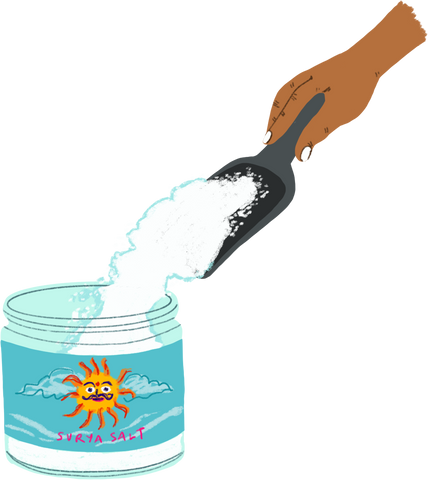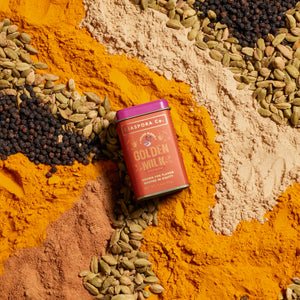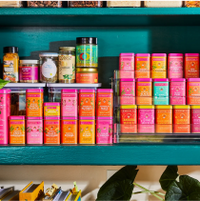First the historical context:
Of all the items in our pantries, salt is probably the most commonplace, the most quotidian, and the most used in diets around the world. Salt provides key nutrients in our diets, allows us to round out our dishes, and has even inspired political movements!
Salt in India, especially Gujarati salt, has a deep political history. In 1930, Mahatma Gandhi gave salt a special place in India’s history through the Dandi Salt March, an act of civil disobedience against the unjust tax laws imposed by the British ruling at the time that involved tens of thousands of Indians marching roughly 240 miles.
Indians were protesting Britain’s Salt Act of 1882, which prohibited them from collecting or selling salt, as it meant that the British not only held a monopoly over the manufacture and sale of salt, but also charged an atrocious salt tax. Whilst the march did not lead to the salt laws being immediately rescinded, it united the subcontinent in the fight against colonial rule like never before. In Gandhi own words when their 240km journey ended on the coast, he picked up a handful of salt and held it aloft in triumph - “With this,” he announced, “I am shaking the foundations of the British Empire.” And so it did, making Gujarati salt forever emblematic of the fight for freedom and the power of civil disobedience.
Today, India is the third largest producer of salt, and 70% of India’s salt comes from the state of Gujarat. Our salt is sourced from the Little Rann of Kutch in Gujarat and is produced by the Agariya community, a tribe that has been doing this work for generations. Business as usual in this industry is fraught with awful labor practices both in the desert and in the salt refineries, excessive diesel usage creating unhealthy working conditions, and finally, corrupt middle men earning most of the money. So it's taken three years to figure out how to begin to do this differently. The hope, one that will take years of work and investment to realise, is that eventually working in the salt desert can come to represent a fair wage, and a way for the Agariya community to prosper and be deeply appreciated for their work. When we set about to launch salt, we knew that it had to reflect the Diaspora Co. values, and that it had to quite literally take the metaphor of salt as freedom and put it into practice. We’re proud of our Surya Salt and our partnership with the Agariya community, and as always we aim to be transparent in our efforts with our community to showcase our commitment to doing better by our farm partners. Read on to learn about how our salt is harvested and processed in an effort to protect our farmers.
How Our Salt is Harvested:
Using solar pumps provided by our local NGO partners, the Agariyas harvest our bright, inland salt from the desert’s underground water table. For decades, diesel-powered pumps were the main way folks were able to harvest salt. Solar-powered units help remove that cost of buying diesel, and as a result the salt workers don't have to absorb that additional cost anymore.
Every year during the monsoons, the sub-levels of the desert soil collect rainwater. As it is being harvested, the salt’s high-mineral content is preserved through a slow-filtration process through the desert soil. And the following year, monsoons allow the process to begin again.


1. During the monsoon, water from rainfall and overflowing rivers seeps through the earth and is filtered down into the desert's underground water table.

2. Using solar-powered bore wells, farmers pump this water up during the hot season.

3. The salt farmers prepare the land into channels and rectangular, box-like beds known as tambadas for the water to be pumped into, flow through, and finally evaporate in. This process takes approximately 30-40 days.
 4. Since they're pumping out briny groundwater, the desert temperature needs to be an average of 24-26 degrees Celcius so that the water evaporates slowly enough for salt crystals to form.
4. Since they're pumping out briny groundwater, the desert temperature needs to be an average of 24-26 degrees Celcius so that the water evaporates slowly enough for salt crystals to form.

5. It takes about 45 days for softer, slushy salt crystals to form.

6. Over six months, the crystals solidify and become stronger in minerality and flavor until they're ready for harvest.

7. The crystals are frequently raked to encourage them to grow and dry uniformly.
How Our Salt is Processed:
In partnership with a local women's self-help group, whose members hand-pound the salt to the perfect texture for everyday use, we are able to ensure that the salt retains as much flavour as possible while also preventing dangers associated with working with salt.
Typically, salt processing can often pose occupational hazards and long-term health effects. Most processing/refineries are unsanitary, reflect poor and unsafe working conditions, and lack protective gear like masks and gloves. The ragged, uneven crystals cause ulcers and painful skin lesions. The constant reflection of the harsh sunlight on the water and crystals results in the early onset of cataracts. Our NGO partner provides protective wear to our salt farmers so that they have access to gumboots, gloves, and glasses. The newer generation of salt farmers in particular takes to these changes and understands the need to protect themselves from long-term health issues.
Ultimately, our NGO partner and the self-help women's group work to ensure the quality of the salt and the working conditions.
 1. Salt is washed and dried again to remove impurities. It is then transported from the salt pans about an hour and half away where a local self-help women’s group.
1. Salt is washed and dried again to remove impurities. It is then transported from the salt pans about an hour and half away where a local self-help women’s group.

2. Here the salt is hand-pound into a finer texture. At this point, the salt is not free flowing, but it is fine.

3. The salt is then packed and sent to Diaspora Co. HQ in Bombay!














